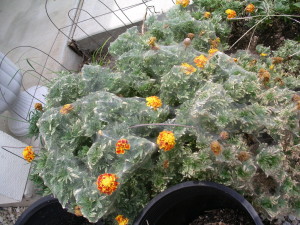Do you have webbing covering plants in your landscape? Or maybe, you have webbing covering some of the leaves on your plants? Check the underside of the leaves for spider mites.
Spiders mites are not insects, but arachnids more closely related to spiders. They are very small, often looking like little dots running around on the leaf surface. If you look with a hand lens, you’ll see that adults have eight legs and oval shaped bodies. Immatures resemble adults (except for the first stage out of the egg which onl y has six legs), but will be smaller in size.
y has six legs), but will be smaller in size.
Spider mites thrive and reproduce rapidly in hot weather, so conditions have been great for them lately. A generation can be completed within a week when conditions are favorable. Plants under water stress can become infested with spider mites.
Spider mites cause leaves to get a speckled appearance, called stippling, where the mites suck juices from the plant. Leaves may also turn a yellow or bronze color and eventually drop off. Leaves and other parts of the plant may also become covered with webbing.
color and eventually drop off. Leaves and other parts of the plant may also become covered with webbing.
So, what to do about spider mites?
- First off, check that you have an active infestation. Many times people see spider mite damage, but the mites are long gone.
- Ask yourself if you need to do anything or are beneficials doing the job for you.
- Avoid spider mites by reducing stress to your plants with planting in the proper location, watering and fertilizing properly.
- Try knocking spider mites off the plant using high pressure water spray.
- Be aware that sometimes pesticides may cause spider mites to become more of a problem after they are used.
- If you choose to use a pesticide, treat the underside of the leaves where spider mites like to hang out.